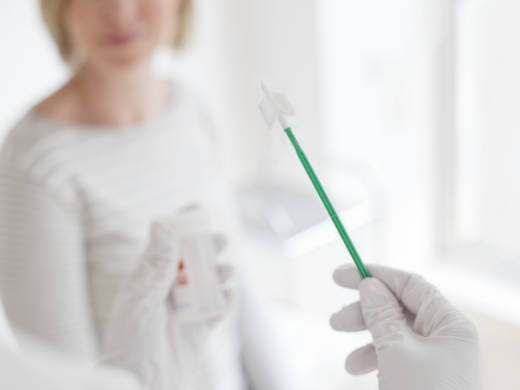And while Pap tests should be repeated every three years, women can wait five years between HPV tests.
"Five years is a good balance between the benefits and harms," Owens says. "It's still highly effective at detecting cancer, and screening more frequently than that may increase some of the potential harms, so we think that's a good interval."
Potential harms of too frequent screening include unnecessary follow-ups such as biopsies. In a draft recommendation released last year, the task force had considered suggesting just two options, either the Pap smear or the HPV test, but its final recommendation included the hybrid test too.
"The HPV test alone is not available everywhere," Owens explains. "And so we want to be sure that women no matter where they're receiving care have options for cervical cancer screening."
He says the combination test is widely available, as is the Pap test, "so all of those are good options and a woman can discuss with her physician what's available at the place where she's receiving care."
Women may not notice the difference between tests because tissue samples are all collected the same way. But Debbie Saslow, senior director for HPV-related and women's cancers at the American Cancer Society, says if women have a choice, she would recommend the HPV test for women over 30.
"I truly believe that including the HPV test, either along with the Pap or instead of the Pap, is superior than the Pap alone," she says. There's some evidence the HPV test is better than the Pap test at detecting a less common form of cervical cancer, adenocarcinoma, she says. "So wouldn't you rather find the two most common cancers instead of just the one most common type?"
The task force emphasizes that all three tests are highly effective. The overarching recommendation is simply that women should get screened, and to do so regularly until the age of 65. If screening has been adequate up to that point, the task force says women do not need further cervical cancer screening.
Health officials also recommend the HPV vaccine, which is given to girls and young women, up to age 26. (Boys and young men are encouraged to get the HPV vaccine as well.) But Owens says a vaccine alone doesn't replace cervical cancer screening.
"Our recommendation applies to everyone whether you've been vaccinated or not," he says. "It's very important that women do not forgo screening because they've been vaccinated."
An effective vaccine could ultimately render cervical cancer screening unnecessary, but that change will require careful study and could be years away.
You can reach Richard Harris at rharris@npr.org.
Copyright 2018 NPR. To see more, visit http://www.npr.org/.
9(MDAxOTAwOTE4MDEyMTkxMDAzNjczZDljZA004))

9(MDAxOTAwOTE4MDEyMTkxMDAzNjczZDljZA004))